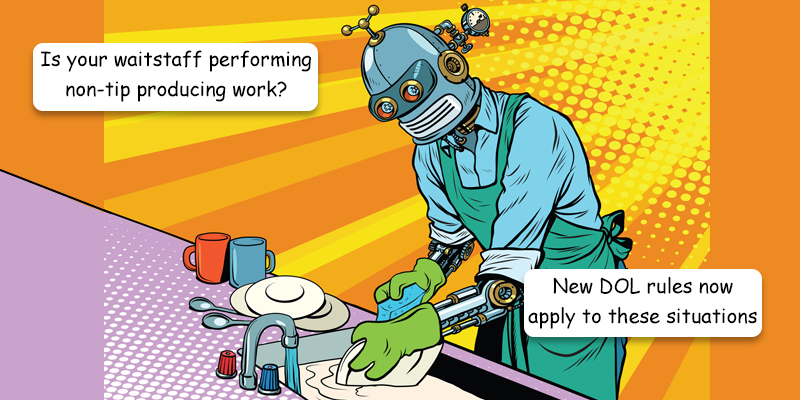On October 28, 2021, the U.S. Department of Labor (DOL) issued a Final Rule, which takes effect on December 28, 2021; it is extremely important for businesses that pay the lower “tipped minimum wage” to take notice. In this final rule, the DOL finalizes its proposal to withdraw one portion of the Tip Regulations Under the Fair Labor Standards Act (FLSA 2020 Tip Final Rule) and finalize its proposed revisions related to the determination of when a tipped employee is employed in dual jobs under the Fair Labor Standards Act of 1938.
Specifically, the Department of Labor is amending its regulations to clarify that an employer may only take a tip credit and pay the lower tipped-minimum wage, when its tipped employees perform work that is part of the employee’s tipped occupation. Work that is part of the tipped occupation includes work that produces tips, as well as work that directly supports tip-producing work, provided the directly supporting work is not performed for a substantial amount of time.
What all this means is that there will be three types of work your tipped employee may perform. Based on the work performed and how long it is performed, you may not be allowed to pay the lower tipped-minimum wage and must pay the standard minimum wage. Here are the three categories:
- Tip-producing work – Under the Final Rule, an employee engaged in “tip-producing work” can be paid using the lower tipped-minimum wage without any limitation on the hours engaged in tip-producing work. For the most part, this is the easy category, as it includes work such as taking orders, serving food, pouring drinks, processing payment, and clearing the table.
- Work that is not part of the tipped occupation – This is work that does not provide service to customers for which tipped employees receive tips. This includes work such as cleaning bathrooms, preparing food and taking inventory. An employer may not use the tip credit for any of the time spent performing such tasks, and standard minimum wage must be paid for this work.
- Directly supporting work – Employers may take the tip credit when an employee is engaged in work that is not “tip-producing,” but rather “directly supporting” of tip-producing work. In addition, directly supporting work cannot be performed for a “substantial amount of time,” which the Final Rule defines as either (a) more than 20% of the hours in the workweek for which the employer has taken a tip credit; or (b) a continuous period of time that exceeds 30 minutes. This type of work would include filling salt and pepper shakers, folding napkins, and rolling silverware.
The Final Rule provides many examples of work that falls under each of those three categories, and you may already see that determination of the proper working category can be tricky. Reading through that final rule Two different people may perform the same work, and one may need to be paid at the regular minimum wage, while the other can be paid the lower-tipped minimum wage. Some cases may be clear cut. For example, if you have a server come in more than 30 minutes prior to their waiting on tables, performing side or prep work, then without a doubt, that would need to be paid at the regular minimum wage.
We foresee an increase in litigation in this area, so be sure you have a clear understanding as to this new rule and what minimum wage rate applies to the work being performed. You may want to reassign duties to keep servers from performing any questionable work that would interfere with paying the tipped minimum wage rate. Now is the time to make those changes as you have about a month until this goes into effect.
If you utilize an automated timekeeping system, you may start to require the employee to track their work by punching in and out multiple times during their shift based on the work performed. For example, the employee punches in when they arrive at work and track their time under the “work that is not part of the tipped occupation” category. Then, when they start to wait on guests, they would punch in under the “tip-producing work” category. It would then be the employee’s responsibility to then punch in again when their serving ends and they are performing any end of shift/clean-up duties. If you utilize PayMaster for your timekeeping, this can easily be done with most timeclocks we offer. If not, then check with your timekeeping vendor. If you are manually tracking your employees hours, now may be the time to think about implementing an automated timeclock with this tracking ability.
While I make every attempt to ensure the accuracy and reliability of the information provided in this article, the information is provided “as-is” without warranty of any kind. PayMaster, Inc and Romeo Chicco do not accept any responsibility or liability for the accuracy, content, completeness, legality, or reliability of the information contained. Consult with your CPA, Attorney, HR Professional, or Labor Attorney to ensure compliance.

